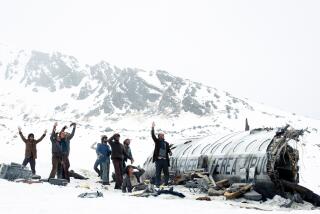Review: Hector Tobar’s ‘Deep Down Dark’ chronicles Chile’s mine-shaft miracle
Perhaps only the most determined recluse could have remained unaware of the drama that played out four years ago on the deserts of northern Chile. Readers will recall the incredible story of 33 miners trapped deep under ground after a massive explosion blocked their escape. For more than two weeks in August 2010, no one aboveground knew if any of the miners had survived the catastrophe.
Seventeen days later, rescuers withdrew a drill they’d used to bore a narrow hole into the mine’s emergency chamber, nearly a half-mile below. As the drill bit was hoisted from the shaft, officials and workers were astonished to find a note taped to its tip. “We are well in the Refuge,” read the scrap of paper. It was signed, “The 33.”
Overcome with emotion, rescuers wilted to their knees. The ramshackle encampment erected by family members at the entrance to the mine erupted in jubilation. News flashes from the site electrified a global audience in real time. A storybook ending saw the men emerge 69 days later, in mid-October, from the bowels of the Earth, shuttled one by one to the surface in a custom-built capsule to an ecstatic reception led by Chilean President Sebastián Piñera.
While the story’s conclusion is no secret, few have known the details of how the men endured a hell of darkness and deprivation, and how their women fought tooth-and-nail for their rescue, especially in those early days before the first drill broke through to the chamber and announced to the world that they were alive — all of them.
The miners’ journey into the underworld and their miraculous return is an epic tale for all time. In his new book, “Deep Down Dark,” journalist and former Times staffer Héctor Tobar proves equal to the occasion. Weaving together the drama of the miners’ harrowing ordeal below ground with the anguish of families and rescuers on the surface, Tobar delivers a masterful account of exile and human longing, of triumph in the face of all odds. Taut with suspense and moments of tenderness and replete with a cast of unforgettable characters, “Deep Down Dark” ranks with the best of adventure literature.
Unlike other odysseys that have involved adventurers facing peril thousands of miles from civilization, the story of Los 33 unfolds in a vertical landscape in which a mere half-mile separates the miners from their loved ones. But that half-mile presents a more formidable barrier than the seven oceans, and it will require one of the greatest rescue operations in history to surmount.
Electing to write in the present tense, Tobar draws us in from Page 1. We get evocative snapshots of intimacy from Chile’s far-flung corners, as the men take leave of loved ones to begin their respective commutes to the San Lorenzo Mine, unaware of their imminent rendezvous with terror. Darío Segovia lingers with his wife in a silent embrace on their doorstep. Alex Vega is deprived of his wife’s customary workday kiss because she’s mad at him, “though she will soon forget the reason.” Some have traveled hundreds of miles by the time they report for a two-week rotation on the A shift at the crumbling pit. In a foreshadowing of the impending disaster, we learn that the tightfisted owners have been cutting corners, “gambling with the miners’ lives” to squeeze profit from the depths of the wheezing, honeycombed mountain.
Rumblings like distant thunder greet the men as they descend in threes and fours aboard trucks and payloaders, as if “entering the dark, dank and vacant landscape of a miner’s subconscious.” They follow the tight switchbacks of the main ramp all the way to the bottom, 2,200 feet below the surface. The men set to work, wringing the last flecks of gold and copper from the exhausted mountain.
Ears plugged against the racket of their machinery, several miners remain oblivious to the thunderous explosion until they are knocked off their feet by the ensuing shock wave. As the dust clears, the men find that a colossal, skyscraper-size slab of rock has broken loose and crashed through the ramp like an enormous guillotine, as they describe it, blocking their escape to safety.
Reconstructing their stories from exclusive interviews later on, Tobar cuts back and forth between the depths of the mine and the frantic rescue efforts on the surface. In the face of feckless leadership from the shift supervisor, a foul-mouthed and mercurial Jehovah’s Witness named Marío Sepúlveda steps to the fore, rallying his companions to keep the faith in their darkest hours. Meanwhile, unbeknownst to the miners, Darío Segovia’s sister María emerges as the undisputed leader of the tent city called Camp Hope with her dogged insistence that the men were alive and “need their families to fight for them.”
Once contact has been established with the surface, the men receive vital supplies and perhaps more importantly, word that the families and indeed the entire world are behind the rescue. But they must now endure weeks in dark isolation as a new hole is drilled that will be wide enough to take them out.
If the miners bear some resemblance to a motley band of sailors blown terribly off course in an ancient Homeric legend, their women battling for their return evoke the stoic determination of three dozen Penelopes. And therein may lie the secret to this book’s page-turning resonance. It’s a story as old as the ages. And it really happened, happened in our lifetime, privileging us for a fleeting moment with a glimpse at the miracle of our common humanity, the mystery of our species’ true potential for goodness, self-sacrifice, and courage in the face of imminent death.
Wallace is a Ted Scripps Fellow in Environmental Journalism at the University of Colorado at Boulder and author of “The Unconquered: In Search of the Amazon’s Last Uncontacted Tribes.”
Deep Down Dark
The Untold Stories of 33 Men Buried in a Chilean Mine, and the Miracle That Set Them Free
Héctor Tobar
Farrar, Straus and Giroux: 306 pp., $26
More to Read
Sign up for our Book Club newsletter
Get the latest news, events and more from the Los Angeles Times Book Club, and help us get L.A. reading and talking.
You may occasionally receive promotional content from the Los Angeles Times.






